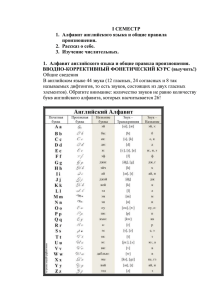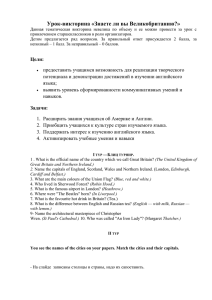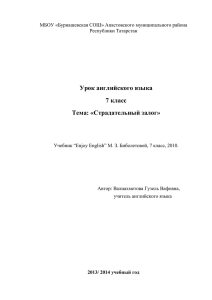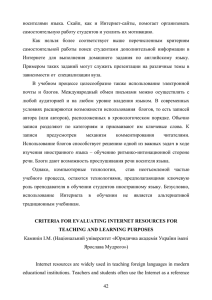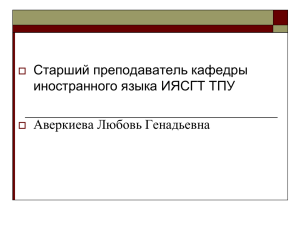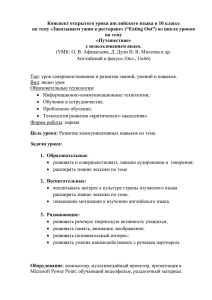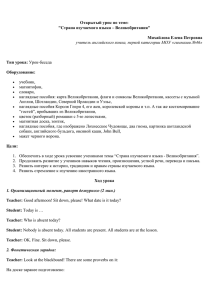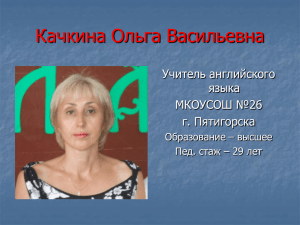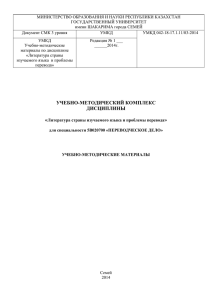«Страны изучаемого языка», «Английские пословицы и поговорки»
advertisement
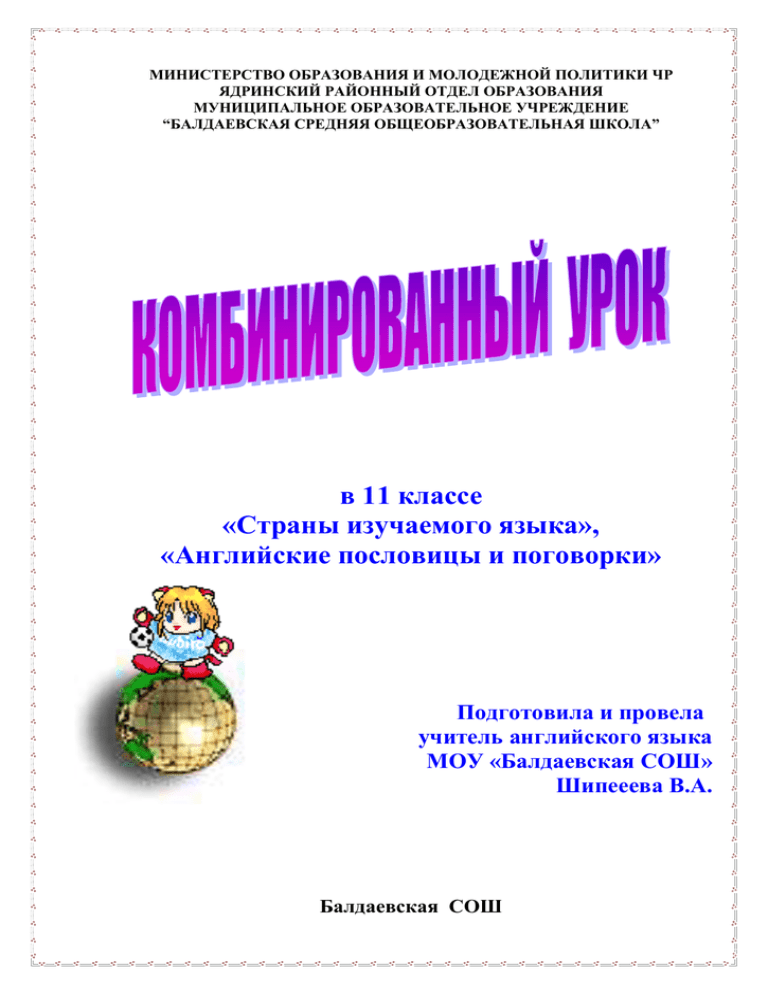
МИНИСТЕРСТВО ОБРАЗОВАНИЯ И МОЛОДЕЖНОЙ ПОЛИТИКИ ЧР ЯДРИНСКИЙ РАЙОННЫЙ ОТДЕЛ ОБРАЗОВАНИЯ МУНИЦИПАЛЬНОЕ ОБРАЗОВАТЕЛЬНОЕ УЧРЕЖДЕНИЕ “БАЛДАЕВСКАЯ СРЕДНЯЯ ОБЩЕОБРАЗОВАТЕЛЬНАЯ ШКОЛА” в 11 классе «Страны изучаемого языка», «Английские пословицы и поговорки» Подготовила и провела учитель английского языка МОУ «Балдаевская СОШ» Шипееева В.А. Балдаевская СОШ Программа проведения семинара учителей английского языка общеобразовательных школ Ядринского района «Кто не знает ни одного иностранного языка, тот не знает свой собственный». Дата проведения Место проведения: Актовый зал Порядок проведения 1. 8.30 – 9.00 – заезд участников семинара. 2. 9.00 – 9.20 – экскурсия по школе с посещением «Уголка истории Балдаевской средней школы». 3. 9.20 – 11.00 – открытый урок в 11 классе совмещенный с внеклассным мероприятием – проводит учитель английского языка Шипеева В.А. Тема урока: «Страны изучаемого языка» и «Английские пословицы и поговорки». 4. 11.00 – 11.40 – обед. 5. 11.40 – 12.20 – анализ посещенного мероприятия. Дирекция школы План-конспект комбинированного урока по темам «Страны изучаемого языка», «Английские пословицы и поговорки» учительницы английского языка Балдаевской СОШ Шипеевой В.А. Комбинированный урок В 11 классе по темам: 1) «Страны изучаемого языка»; 2) «Английские пословицы и поговорки». Цель урока: 1) Обобщение изученного материала; 2) Формирование у учащихся устойчивых знаний о странах изучаемого языка, развитие их кругозора и повышение познавательных интересов к языку; 3) Формирование у учащихся навыков свободного общения на английском языке. Задачи урока: 1) Расширить кругозор школьников, обогатить их словарный запас, учить школьников следовать мудрым пословицам в жизни. Место проведения: Актовый зал школы Оснащение урока: 1) Высказывание великих людей о языке: o “A foreign language is a weapon in the struggle of life”. o “Who doesn’t know any foreign language, he doesn’t know his own”. 2) Английские и русские поговорки: o “As the people, so the proverb”. o “Time passes away, but sayings remain” o “Пословица не даром молвится: без угла дом не строится, без пословицы речь не молвится”. 3) Стенгазеты на английском языке. 4) Картинки, иллюстрации к пословицам. I. Орнамент. Good morning my dear boys and girls. Today we are going to have an unusual lesson. You see we have many guests. They are teachers of foreign languages of schools of our district. Today you will speak about the main Englishspeaking countries and the aim is to show your ability to speak English. Our lesson also is devoted to English proverbs and sayings. Proverbs are the wisdom of the people whether they are English, French or Russian. Proverbs teach us about life. They explain how to choose friends? What is right and wrong in peoples’ behavior? and so on. II. Фонзарядка. Now, some phonetic drills. Repeat after me some everyday phrases: o to my mind; o as far as I know (remember); o I quite agree with you; o I can’t agree with you; o you are mistaken (wrong, right); o by the way…; o I don’t think so…; o I have no idea; o It seems to me that…; o Etc (10-15 фраз) III. Учебный разговор. T->P1P2P3 по теме “Страны изучаемого языка”. It is time to speak about English-speaking countries. Try to use everyday phrases. Agree or disagree with me. Correct, if I’m mistaken. 1) Canada is the biggest English-speaking country. 2) The USA is washed by two oceans. 3) There are no mountains in Great Britain. 4) Washington is the largest city in the USA. 5) The population of the USA is about 250 mln. 6) The Congress of Australia consists of the Senate and the House of Commons. 7) Now the president of the USA is Bill Clinton. 8) Great Britain is the smallest of 5 English-speaking counties. 9) Australia is bigger then the USA. 10) Mississippi flows in Canada. Questions: 1) Where is the USA situated? 2) What is the capital of Canada? 3) What is the longest river of the USA? 4) Who is the queen of England? 5) Where does Mackenzie flow? 6) What is the capital of Scotland? 7) How many Houses does the British parlament consist of? 8) What country is called a country of lakes? 9) What is the Prime-minister of Great Britain? 10) Name 5 Great Lakes of the USA. IV. Работа над пословицами. a) Закончить пословицы: One man’s mistake… To get out of bed… An hour in the morning… If you want a thing well done… Well begun… He laughs best… Doing nothing is… In at one ear… and so on. b) Назвать по-английски: В гостях хорошо, дома лучше. Не живи, чтобы кушать, кушай, чтобы жить. Всему свое время. Учиться никогда не поздно. Исправиться никогда не поздно. Друг познается в беде. и т. д. c) Назвать пословицы по-русски: Dog doesn’t eat dog. Don’t teach a fish to swim. You will know the price of a thing after you have lost it. The appetite comes with eating. When in Rome, do as the Romans do and so on. (Здесь учащимся нужно догадаться о значении пословиц, т.к. они неизвестны). V. Минута поэзии. “Red, Red Rose” IX кл. “Babies”. V кл. “Child’s Wish”. VI кл. “If…” XI кл. VI. Использование пословиц в ситуациях. a) “The Fox without a Tail” b) “One never loses anything by politeness” c) “Where there is a will, there is a way” d) “One man’s mistake is another man’s lesson” e) “A friend in need is a friend indeed” VII. Сценка “Три поросенка” Once upon a time there lived three little pigs… (Артисты из 7 класса). VIII. Объяснение значений пословиц учащимися. 1) The grass is always greener on the other side of the fence. – Life seems easier better? Happier in any place where you are not at present living or working. 2) Like father, like son. – Children are often like their parents in characters, tastes, opinions, habits, etc. 3) It is never too late to mend. – It is always possible to try to improve one’s character, habits, attitudes to others however long one has been wrong or at fault. 4) Never put off till tomorrow what you can do today. – Carry out a task or duty as soon as you can, preferably today. If you leave it tomorrow, you may forget about it or not find time to do it may never be done. 5) Of two evils choose the less. – If you have to choose one of two alternatives, both bad, choose the one that is less harmful or unpleasant than the other. 6) Rome was not built in one day. – Great results are not to be obtained in a short time. 7) Strike while the iron is hot. – Make immediate use of an opportunity; choose the best time for doing anything, the time when conditions are most favorable. 8) Never do things by halves. – Never leave a job half-done; complete properly anything you begin to do. 9) A man can do no mire than he can. – A person can not do more than it is in his power. 10) Keep our mouth shut and your ears open. – Speak little, but listen well to what others say. 11) Necessity is the mother of invention. – If one needs something very badly enough, one becomes very inventive in finding out ways of getting it. All the great inventions have been done to meet certain great needs. 12) Make hay while the sun shines. – Take advantage of the opportunities while conditions are favorable. 13) and etc. (если время позволяет, можно другие пословицы объяснять) IX. Сценка “The Rabbit and the wolf” Wolf: (попал под камень) Help! Help! Oh, help me, please! (Артисты из 6 класса). X. Работа над картинками. Объяснение рисунков, связанных с пословицами. (10 картин с 10 пословицами) 1) A friend in need is a friend indeed. – The best friend is the one who helps you when you are really in need of help. It is a time of misfortune that you know your real friends. 2) All is well that ends well. – If the final result is good, previous failures ore forgotten and there is no need to complain, since the end result is the most important thing. 3) One is never too old to learn. – It is never too late to improve or after one’s behavior, attitudes, way of life in order to lead a better life. One must go on learning as long as one lives. 4) An apple a day keeps the doctor away. – If a person eats an apple every day, he will remain healthy and need no doctor. Apples contain a lot of vitamins. 5) It is never too late to mend. – It is always possible to try to improve one’s character, habits, attitudes to others however long one has been wrong or at fault. 6) The early bird catches the worm. – The person who gets up early to work will be successful; those that arrive early at a place have the advantage over the latecomers. 7) A bad workman always blames his tools. – A careless or unskilled person blames his tools to excuse himself for bad work, while it is his own carelessness or lack or skill which is really to be blamed. 8) Love is blind. – A lover cannot see any weaknesses and shortcomings in the person he loves. 9) Don’t play with fire. – Do not risk with dangerous articles, especially when it is foolish and unnecessary; do not put yourself into a position that may be dangerous. 10) East or west, home is best. – Your home is where you are likely to be happiest, especially in comparison with other places you may be at the time. XI. Работа над текстом “All is well that ends well”. (текст прилагается) 1) Чтение учащимися текста по частям (2-3 раза). 2) Перевод текста на русский язык. 3) Составление учащимися вопросов к тексту и ответы на них. (Здесь все типы вопросов). 4) Пересказ текста. 5) Выполнение грамматических заданий. XII. Игра “Сильное звено”. (Принимают участие лучшие учащиеся класса). 1. The main countries where people speak English. 2. What is the capital of Great Britain? 3. How many letters are there in the English alphabet? 4. Name the days of the week. 5. Where is Trafalgar square? 6. Who wrote the novel “Robinson Crusoe”? 7. How many stripes are there on the American flag? 8. Who discovered America? 9. When was America discovered? 10.What is the name of the main island where New York is situated? 11.Where is there White House? 12.The symbol of Scotland? 13.The biggest city of the USA. 14.Who is the author of “Jane Eyre”? 15.How many sounds are there in the English language? 16.What colour are buses in Great Britain? Назвать по-английски. 17.Встать с левой ноги. 18.Друг познается в беде. 19.В гостях хорошо, дома лучше. 20.Век живи, век учись. 21.Поживем, увидим. 22.На ошибках учимся. 23.Кто не делает ошибок, тот не делает ничего. 24.Все хорошо, что хорошо кончается. 25.Name seasons in English. 26.Where is Hyde Park? 27.Who is the author of “Gulliver’s Travels”? 28.The first president of the USA. 29.Where is the highest building in the world situated? 30.When was Washington founded? 31.What is Broadway? 32.What was invented by brothers Wrights? Translate into Russian. 33.There is no smoke without fire. 34.What man has done, man can do. 35.Walls have ears. 36.All roads lead to Rome. 37.A bird in the hand is worth two in the bush. 38.Curiosity killed the cat. 39.Don’t teach fish to swim. 40.You will know the price of a thing after you have lost it. 41.What is the symbol of England? 42.The author of “Ivengo”. 43.The largest state of the USA. 44.What is Cambridge famous for? 45.A well-known English physicist, mathematician, who discovered the law of gravitation. 46.Name winter months. 47.Who is author of “Alice in Wonderland”? 48.The National symbol of the USA/ 49.When is the Independence Day in the USA? 50.Who was the president of the USA during the Civil War? 51.Who wrote the declaration of Independence? 52.What did Henry Ford invent? 53.The symbol of Wales? 54.The author of “The Jungle Book”. 55.The famous American city of skyscrapers. 56.The most famous poet and writer in the British History. 57.Назовите формы неопределенного артикля. 58.Проспрягайте глагол to be в настоящем простом времени. 59.Порядковое числительное от количественного 1. 60.Абсолютная форма от притягательного местоимения our. 61.Степени сравнения прилагательного short. 62.Степени сравнения прилагательного comfortable. 63.Степени сравнения прилагательного good. 64.Степени сравнения прилагательного little. 65.Назовите формы определенного артикля 66.The capital of Australia. 67.The capital of Northern Ireland. 68.Name summer months. 69.Who is the author of “The Treasure Island”? 70.Who was the first man on the moon? 71.When do Americans say “Happy Thanksgiving”? 72.Who wrote the declaration of Negro liberation? 73.The highest building in Washington. 74.What did Al. Bill invent? 75.The symbol of Northern Ireland. 76.The city of Yellow Devil? 77.Another name of Northern Ireland. 78.When was Moskow founded? 79.When was Cheboksary founded? 80.When was Yadrin founded? 81.Who is the President of Russia? 82.Who is the President of USA? 83.The symbol of Russia. 84.The emblem of Russia. 85.Who wrote “War and Peace”? 86.Формула прошедшего завершенно-длительного времени. 87.Формула простого прошедшего времени. 88.Формула настоящего завершенного времени. 89.Формула прошедшего длительного времени. 90.Формула будущего длительного времени. 91.Формула настоящего простого времени. 92.Формула будущего завершенного времени. 93.Формул прошедшего завершенного времени. 94.Мой брат часто играет на пианино. 95.В то время я читал интересную книгу. 96.Когда мы пришли на станцию вчера, поезд уже ушел. 97.Я буду делать зарядку каждый день. 98.Ты когда-нибудь был в Москве? 99.Мы не видели друг друга целую вечность. Примечание к игре: Все участники играют до конца. Вопросы задаются по очереди. Если кто-нибудь не может ответить на свой вопрос, отвечает тот, кто первым поднимет руку и набирает себе баллы. XIII. Подведение итогов игры и всего урока. Объявление оценок. Домашнее задание на следующий урок не задается. Использованная литература: 1) Учебники 2) Книга для учителя 3) Журнал “Иностранные языки в школе” 4) “A book of English and Russian Proverbs and Sayings” by M. Dubrovin. 5) “Play and Learn English” by Sh. Hamamdjan. На уроке также использованы грамматические таблицы.
